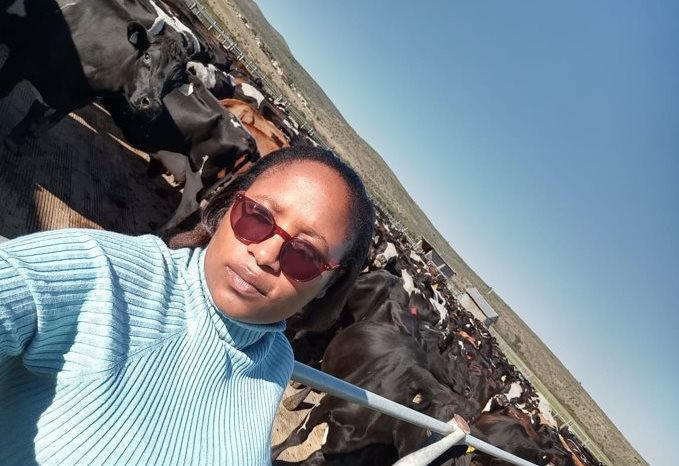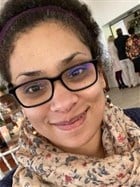Meet 30-year-old Zipho Makwabe, dairy enthusiast and agricultural economist at Amadlelo Agri, who is breaking new ground, shattering stereotypes and garnering much-deserved respect in the male-dominated agricultural sector.

Source: Supplied |
A young, black female, Makwabe has already conquered the scepticism of industry stalwarts and inspired her peers. Here, Makwabe tells us more about herself, what inspired her to take up a career in agriculture and the barriers she faced as a woman of colour in her industry.
Tell us about yourself
I am an agricultural economist at Amadlelo Agri, meaning I assist the company’s leadership with reviewing and assessing potential new projects’ economic viability and then project implementation.
The company’s production manager and I also constantly look at and provide strategic direction of the company’s financial performance which is key for Amadlelo Agri which operates five dairy farms and is a strategic investor in a macadamia farm, a piggery, and food manufacturing company Dairy Food Group. Amadlelo brings together the communities, the government and investors to unlock opportunities in communal land.
I was born 30 years ago in a small township called Dimbaza in the Eastern Cape, about 11 km northwest of King William's Town. My family then moved to Port Elizabeth when I was slightly older.
I have a degree in agricultural economics obtained from the University of Fort Hare in 2018.
I also have a twin sister: Zovuyo Makwabe. Our parents enrolled us in an agricultural high school, but funny enough, I never studied any agricultural subjects. After completing grade 12, I registered to study financial accounting at the Durban University of Technology. But I soon found out that I didn’t have a passion for accounting so I dropped out in the middle of my first year.
My high school friends convinced me to study something to do with agriculture but not too far from my accounting studies. I have them to thank because they had actually applied for me to study agriculture at the University of Fort Hare. So, I opted for agricultural economics and I fell in love with the course although it was very, very challenging!
I have twin boys aged five, and I enjoy taking them to my farm. It's really funny to see them running after cows and then cry when the cows chase them back.
I have six siblings, four nieces, four nephews who I adore.
I get my passion for animals from my parents. My mom had more than 15 cats at home. And at some point in time we had hamsters, tortoises as well as rabbits, and many, many dogs. So, I can safely say I have always been surrounded by animals.
What inspired you to take up a career in the agriculture sector?
I never in a million years thought that I would pursue a career in agriculture. I was a top student in Geography and Life Sciences. And at one stage I thought I was either going to be a doctor or a geologist. But I come from a family of farmers that was very well known even back in the days.
While I was at Fort Hare, I kept hearing about my great grandfather, who was also a well-known farmer. I realised that I had big shoes to fill and just how proud I am of I took pride in my heritage and so developed the drive to continue his legacy.
I was discouraged at first because I was a city girl in a sector dominated by males within rural communities. I nonetheless persevered because it could see the value of theoretical studies come alive.
I also used to watch my big brother, who is also an Agricultural Economist, doing research at home for seminars for his work. This became an additional inspirational force for me.
What barriers have you faced as a woman of colour in your industry. How have you overcome them?
Agriculture is still a male-dominated sector. Generally, women’s views on operational issues are not taken seriously. This really got to me and I got discouraged from pursuing my dream of being a farmer. But I picked myself up, and consulted for Pineapple Farmers Association in Pedi area, on a voluntary basis.
Although I was not getting paid, I interacted with mature and experienced farmers. I actively participated in their meetings, gathering information, improving my knowledge and enabling me to apply what I learned at University.
As a woman – and a young one at that - I stood out like a sore thumb but it did not deter me. Although I was only in my twenties, the farmers realised that I was adding value, saving them money and improving their produce. They began to listen and shared valuable information with me, bolstering my confidence.
I realised that even though formal education is important as it opens doors for you, nothing beats on-field experience. Most of the experienced commercial farmers you come across are white males. I was expecting this and had found a way to deal with it. Fortunately, we also came across white but progressive farmers who were prepared to work with us and more importantly, open doors to access the market.
However, the biggest barrier is one’s own mindset. Many people believe that the agricultural sector will take forever to transform and therefore indirectly discourages you. So, you must be aware of the gender, racial and financial challenges ahead and decide up front that you will overcome them no matter what.
What other skills or talent do you have?
I love water. Every opportunity I get to swim, I jump in headfirst. I also enjoy reading and have been practising my writing skills. Those around me say I am a natural writer and should consider writing a book. Perhaps one day when I have time I will write a book; maybe a novel.
Where do you see yourself in five years?
I see myself living on my own farm with cows, horses and goats. etc. I also see myself owning an abattoir and a butchery so that I can sell directly to the community. I am working with my twin sister on this project. So, far things are going so well. And you know what they say about twins, whatever, we touch we double!
We are an entrepreneurial family. My twin sister and her business partners buy written-off and bank-repossessed vehicles and repairs them with her team of mechanics, panel beaters and auto electricians then resells them. We are considering integrating our businesses to have a fuel garage with a retail store that sells produce and meat from our farm.
Tell us more about your 'side hustle' – what inspired it?
I have a few side hustles! I buy livestock such as cows, goats and pigs from other farmers and sell them in the marketplace. I offer agricultural consulting services to emerging farmers young and old. And I also have a livestock stokvel which I started with my friends. I have a belief that if there are stokvels for food and money, why can’t we also have livestock one? I saw this gap because it is very challenging to raise money by yourself to buy livestock.
So, we club together and save money. We buy heifers and goats, let them breed and sell them to nearby communities for funerals and traditional events then split the profits.
What do you love most about what you do?
The constant interaction with many different people fires me up! Some I learn a lot from and others benefit from what I do and the experience I've gained.
Do you have any words of encouragement for the youth this Youth Month or for those starting out in the industry?
One doesn't have to study and have a degree in order to become a successful farmer. You don't need to have a lot of money as well. You can just use what you have, especially communal land which many have in abundance, to get to whatever you want to achieve. You can start with the little resources you have e.g. a home garden to feed your family and sell the excess fresh produce to your neighbours.
Then, always continue to aim higher and dream big; keep on knocking on every door and eventually, one door will open for you.

































